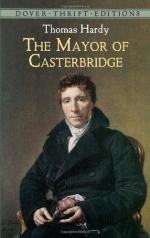Lucetta regarded him with a critical interest. He was quite a new type of person to her. At last his eye fell upon the lady’s and their glances met.
“Ay, now, I’m wearying you!” he exclaimed.
She said, “No, indeed,” colouring a shade.
“What then?”
“Quite otherwise. You are most interesting.”
It was now Farfrae who showed the modest pink.
“I mean all you Scotchmen,” she added in hasty correction. “So free from Southern extremes. We common people are all one way or the other—warm or cold, passionate or frigid. You have both temperatures going on in you at the same time.”
“But how do you mean that? Ye were best to explain clearly, ma’am.”
“You are animated—then you are thinking of getting on. You are sad the next moment—then you are thinking of Scotland and friends.”
“Yes. I think of home sometimes!” he said simply.
“So do I—as far as I can. But it was an old house where I was born, and they pulled it down for improvements, so I seem hardly to have any home to think of now.”
Lucetta did not add, as she might have done, that the house was in St. Helier, and not in Bath.
“But the mountains, and the mists and the rocks, they are there! And don’t they seem like home?”
She shook her head.
“They do to me—they do to me,” he murmured. And his mind could be seen flying away northwards. Whether its origin were national or personal, it was quite true what Lucetta had said, that the curious double strands in Farfrae’s thread of life—the commercial and the romantic—were very distinct at times. Like the colours in a variegated cord those contrasts could be seen intertwisted, yet not mingling.
“You are wishing you were back again,” she said.
“Ah, no, ma’am,” said Farfrae, suddenly recalling himself.
The fair without the windows was now raging thick and loud. It was the chief hiring fair of the year, and differed quite from the market of a few days earlier. In substance it was a whitey-brown crowd flecked with white—this being the body of labourers waiting for places. The long bonnets of the women, like waggon-tilts, their cotton gowns and checked shawls, mixed with the carters’ smockfrocks; for they, too, entered into the hiring. Among the rest, at the corner of the pavement, stood an old shepherd, who attracted the eyes of Lucetta and Farfrae by his stillness. He was evidently a chastened man. The battle of life had been a sharp one with him, for, to begin with, he was a man of small frame. He was now so bowed by hard work and years that, approaching from behind, a person could hardly see his head. He had planted the stem of his crook in the gutter and was resting upon the bow, which was polished to silver brightness by the long friction of his hands. He had quite forgotten where he was, and what he had come for, his eyes being bent on the ground. A little way off negotiations were proceeding which had reference to him; but he did not hear them, and there seemed to be passing through his mind pleasant visions of the hiring successes of his prime, when his skill laid open to him any farm for the asking.




